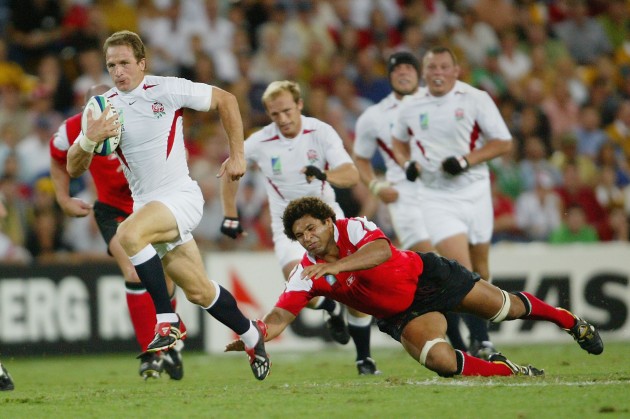The new England coach used his bench sparingly at Murrayfield on Saturday – proving that he was watching the game and not immersed in mumbo-jumbo
Last Thursday, two days before England were due to face Scotland at Murrayfield, Eddie Jones told us his work was done and everything from then on was up to the players. He was almost right.
The coach has one massive responsibility on match day and that is how to use his bench, and Jones showed he’s not afraid to leave people sitting on their backsides if he doesn’t think they will change the game. And on the evidence of his first outing as England head coach, he’s not a bloke who makes replacements with one eye on the clock.
How many times have you been at a game where there is a flood of substitutes on the hour and the whole rhythm of the match goes to pot? Or a side might be leading by a couple of scores, the boss throws on a raft of bench bunnies and the opposition fight back?
At the weekend Paul Hill and Ollie Devoto returned to Luton Airport from Scotland still looking for their first cap and Alex Goode was still stuck on 19 Internationals.

Miracle men: Munster’s famous 2003 Heineken Cup win over Gloucester was achieved without a single sub
Jones had his best poker face on in the coaches’ box during the game and he didn’t play all his cards – just because you’ve got a loaded bench doesn’t mean you have to unload it every time.
If you don’t think the 15 men you picked to start are the best players, then why pick them in the first place?
In 2001, Clive Woodward kept the same 15 players on the pitch for the entire 80 in the 21-15 win over Australia. They were going well – what was the point of swapping them?
Woodward’s most famous substitution came in the 2003 World Cup quarter-final in Brisbane when England were getting caned by Wales. He brought on Mike Catt to look after Jonny Wilkinson, shifted Mike Tindall to the wing and brought off Dan Luger. It was as if he was watching the game and believing the evidence of his own eyes rather than looking at a stopwatch. England won the game but it never caught on.

Catt out the bag: Clive Woodward’s introduction of Mike Catt turned England’s RWC 2003 tie against Wales
One former England captain told me he was worried about Dylan Hartley being made skipper purely because most hookers get replaced with about 20 minutes to go and you want your main man on the pitch at the business end of a Test match.
Well, Hartley lasted 76 minutes and 19 seconds before being hauled off and chucking the captaincy at Owen Farrell. The former England skipper had a point all right but Jones kept his top dog on for almost as long as he could have done.
If you look at England’s last ten matches, before Murrayfield, the hooker was replaced after 53, 51, 52, 55, 48, 59, 74, 66, 60 and 29 minutes. The 29-minute figure is when Tom Youngs went off in the final game of the World Cup debacle against Uruguay to be replaced by Jamie George. Apart from that blip it looks like coaching by numbers to me.
Jones brought on Mako Vunipola, so he could do his Conrad Smith impression, for Joe Marler at loosehead in the 49th minute. In the last ten games, prior to Saturday, the English No 1 was given the old shepherd’s crook after 65, 60, 68, 62, 65, 55, 57, 60, 61 and 70 minutes. Notice a pattern?
And don’t even get me started on tighthead props. The last one to go the distance before Dan Cole on Saturday was Cole in Dublin last year; before that it was Cole in 2014 in Paris. This time Jones saw the Leicester man was doing a job, so kept him on.

Double jeopardy: John Hardie is tackled by Jack Clifford and Courtney Lawes – both effective replacements
Vunipola, Courtney Lawes and Ben Youngs all did the business when they came on, George didn’t really have a chance to blow his Test career or enhance it. But the first three all added something to England’s effort. Isn’t that the point?
We’re told the coaches have all sorts of data up in their eyrie when they’re watching the games. Apparently the GPS systems tell them when someone is vulnerable to injury or when they’re starting to tire. That is all very well but if a coach knows about rugby, he knows about rugby and doesn’t need a boffin to tell him when to empty the bench or to keep things ticking over.
Jones was watching the game and not buried in data. You never know – it might just catch on.
For the latest subscription offers click here, or find out how to download the digital edition here.





